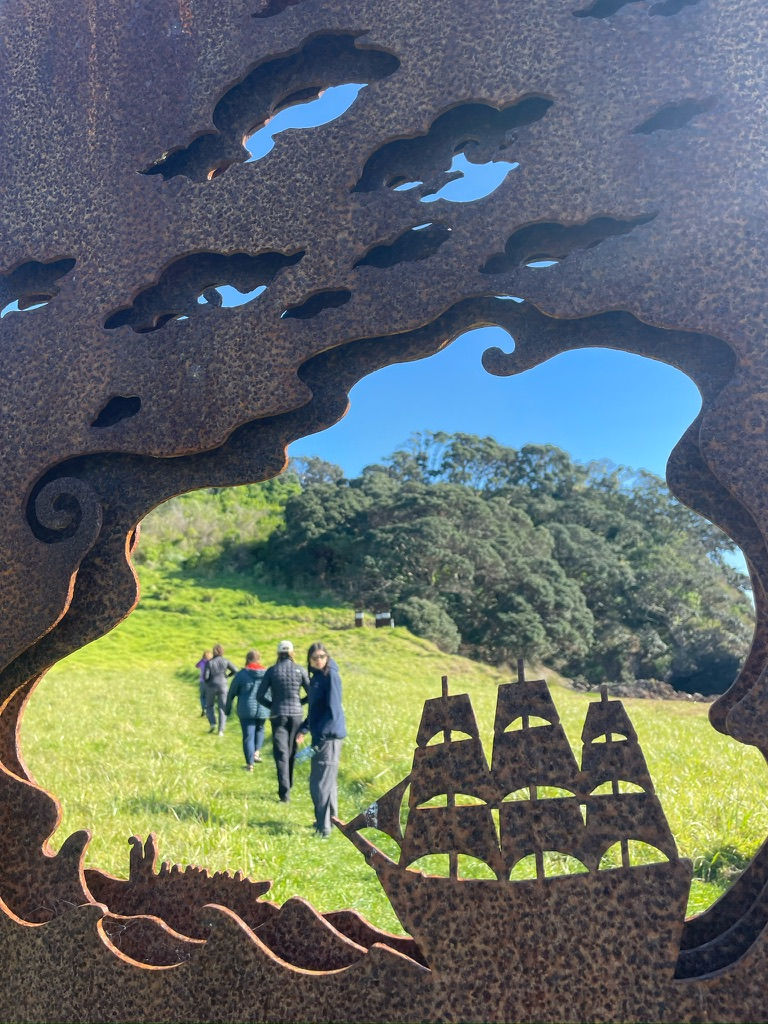A New List: How Southeast Asia Changed my Views on Addressing Climate Change
- Ella Heydenfeldt
- Jan 15, 2024
- 3 min read
Updated: Oct 6, 2024

Upper Right Hand Corner: Smoke drifts up from the beach below
Maneuvering down steep sandstone steps to the Balinese beaches on the island of Nusa Penida, I could see dark smoke wafting up from the green canopy bordering the ocean below.
Finally making it down to the shore, I found piles of plastic, primarily water bottles, being burned in heaps.
While Riley and I were leaving Diamond Beach, a famous tourist attraction, we overheard a European tourist angrily debating with a local, stating how "shameful" it is that they burn their trash and how they are "ruining the environment." Of course, a small part of me agreed—burning trash is horrible for the atmosphere and environment.
But the Balinese man's response struck a chord.
What is our alternative?
They do not have a handy dandy garbageman flying down in a plane to the beach (with no roads leading to it) to pick up the trash predominantly discarded by tourists. There is no current infrastructure to deal with this issue.
How else are the people supposed to handle the immense amount of trash?
Prior to traveling through Southeast Asia, I was in a Wildlands Field Studies program in New Zealand, and one of my assignments was to rank the five biggest problems on Earth in order of importance.
My ranking:
Consumerism
Climate Change
War
Hunger
Access to clean drinking water
Now, before I am attacked for my ordering, or not, let me break down my reasoning.
Consumerism, I argued, is the driving force behind climate change, fueling excessive energy consumption and burning of fossil fuels. From fast fashion to inefficient transportation to overfishing, the adverse impacts all trace back to a culture deeply entrenched in consumption.
My second concern, climate change, intertwines with consumerism in a cause-and-effect relationship, leading to natural disasters and biodiversity loss. We can only live as long as the planet does.
The subsequent three issues – war, hunger, and access to clean drinking water – initially seemed more human-centric, with seemingly straightforward solutions. For example, they don't involve the complex workings of an entire planet with its atmosphere, biosphere, hydrosphere, and lithosphere. They involve the politics of people. These issues, while extremely complex, have solutions that governments must come together to enact.
The world produces enough food to feed all humans; however, people waste ⅔ of all food. To me, perhaps naively, there seem to be tangible fixes to the global issue of food insecurity. As for clean drinking water- is there not a way for countries to implement water purification systems? When it comes to war, it is obviously is a huge issues that leads to deaths and displacement, but technically speaking, the solution for war is merely: "cease-fire."
I was naive. Brought up in a world where there was always food on the table, clean drinking water from the tap, and no battleground in sight.
However, my Southeast Asia journey prompted a profound shift in perspective. The seemingly "easy" issues became more nuanced and interconnected than I had perceived.
I'll give an example.
I remember in my environmental science class in high school, my teacher said, "If you are starving, you don't give a fuck about the endangered sumatran tiger."
This may sound quite crass. But he had a good point.
Many times in the media, local people in the Amazon are vilified for burning their incredible forest. But they do so because it economically makes sense for them. They burn the forest in order to farm the land because that is their best option in order to feed their families.
Do they know that slash-and-burn practices are degrading the land? Of course. But it's either that or their family dies of starvation. What choice would you make?
The imperative to secure food sources and sustain livelihoods often overrides concerns about environmental degradation. Or, in Bali, the imperative to get rid of trash without the help of a waste management system overrides concerns about air pollution.
In Southeast Asia, I found that my list had reordered itself. The trip underscored the critical importance of clean water and food security. It became evident that addressing global challenges, including climate change, necessitates addressing basic human needs first. As my views evolved, I recognized that clear thinking and effective problem-solving hinge on hydration and sustenance – prerequisites that many around the world struggle to meet. Put simply, if your stomach is growling, it is hard to focus on global warming.
Clean water and food insecurity have now claimed top spots on my list and have left me with a simple realization:
We can only work together to heal the Earth once we have healed ourselves.

Polluted river in Bali




"However, my Southeast Asia journey prompted a profound shift in perspective. The seemingly 'easy' issues became more nuanced and interconnected than I had perceived." Love this, Ella-dawg, for two main reasons: -I really respect that you're willing not only to reexamine your beliefs, but also to let go of and update previously held, even passionate beliefs based on new knowledge and a more "nuanced" understanding of an issue. Reexamining/rejiggering one's beliefs is a difficult, humbling, life-long process, but much better than clinging blindly to a crusty old idea, evidence be damned. -Your "profound shift in perspective" happened through deep, thoughtful, immersive travel, the sort where you open your eyes and your heart to the promise of the world. Profound shifts in perspective…